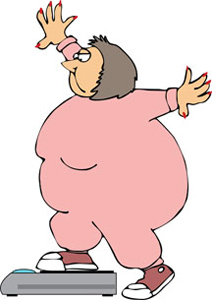October 4, 2010
Dealing With Obesity

By Michael D. Shaw
At the beginning of this year, the CDC announced that Americans, at least as a group, may have reached their peak of obesity. Specifically, the data suggest that the rate of obesity has remained constant for five years for men, and approaches ten years for women and children.
But before we break out the champagne, consider where these numbers leveled off. Almost 34 percent of today’s adults are obese, and that’s twice as many as 30 years ago. For kids, the, uh, growth over the same period was by a factor of three—to 17 percent.
Various theories have been proffered for how we’ve been able to stem the tide. Dr. David Ludwig, director of the Optimal Weight for Life Program at Children’s Hospital Boston wonders if there is simply a “biological limit” to how obese people can become. Ludwig suggests that when people eat more, at first they gain weight, but gradually, more of the calories are expended in maintenance and in moving around all that excess tissue.
Another way of looking at this is the phenomenon of insulin resistance. Insulin resistance is an adaptation that keeps fat people from becoming even fatter. The effectiveness of the insulin molecule is reduced, causing less efficient fat storage (and higher blood glucose, often to diabetic levels).
However, the jury is still out as to whether obesity is actually the cause of insulin resistance. Some authorities blame the high-fat, high-sugar American diet per se. At any rate, obesity is a serious public health issue. How are we to deal with it?
Some will attempt to compare obesity rates to the percentage of smokers. Apparently, there was a leveling off in the number of smokers before an actual decline started. Perhaps obesity is more complicated in that two factors are involved here—physical activity and diet. Steven Gortmaker, Professor of the Practice of Health Sociology at the Harvard School of Public Health, is convinced that obesity will decline only with new policies, like penalties and incentives to promote healthier foods and exercise.
He reminds us that in smoking, “Substantial change didn’t really happen until there were bans on advertising and limits on consumption through things like taxation.”
But, is he advocating taxing unhealthy food? Does anyone really want such a regulatory apparatus in place? The devil, of course, is in the details, and improper definitions have wreaked havoc since the beginning of federal regulations. Is there nothing that the government should stay out of?
What about rated insurance policies?
At present, life insurance underwriting allows all sorts of surcharges for any number of health issues, including obesity. For the most part, this does not occur in group health insurance, but does apply to individual health coverage. These policies can be rated, and in certain cases, coverage can even be denied.
Advocacy groups for obese people decry such practices as unfair, but by whose reckoning? The fact is that insurance is a matter of sharing risk. Is it fair to those who are not obese that they are paying more than their share?
The “It’s not my fault” mantra should fall on deaf ears, as well. There may well be individuals whose obesity is not their fault. But there are surely many others with congenital medical conditions who could claim the same thing.
A problem with trying to fix this with insurance, though, is that health insurance has expanded the notion of “risk” to an unimaginable degree. Back in the day, health insurance was meant to cover long hospital stays and serious illnesses. These days, people expect routine office visits and all drugs to be included. As such, for many folks, good health care means that they don’t have to pay for it.
Given the emergence of Obamacare, the process is already so politicized that any attempts to throw obesity into the mix are probably a non-starter.
What about education? This is problematical. What good does it do to educate a young child on a proper diet if he has no control over food purchases or meal planning? Moreover, what adult truly does not know which foods are healthy and which are not? And, even if they do know, healthy foods are often more expensive and less convenient. Many neighborhoods do not have lavish supermarkets, and sadly, some parents are faced with providing nutrition for their children on a severe budget.
If the government does anything, it should stop subsidizing corn and soybeans to the exclusion of fruits and vegetables. Then, suddenly, healthy foods would be more affordable. Only, don’t hold your breath waiting for that to happen. That’s right: A proximate cause of obesity—since it occurs in disproportionate numbers in the poor—is rotten government agricultural policy.
Funny how the most obvious solution to this problem will likely never occur. Think about that the next time someone asks you about the value of human life, or how much Uncle Sugar really cares about you.

